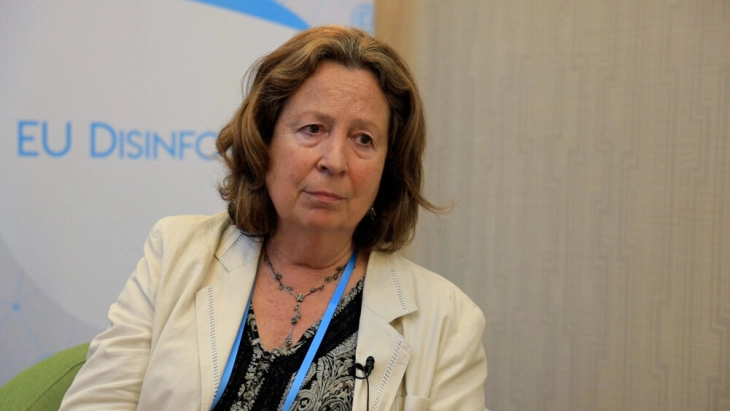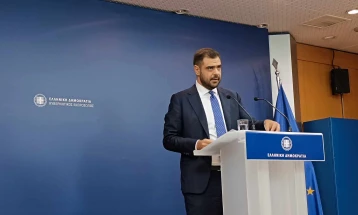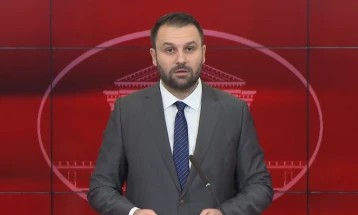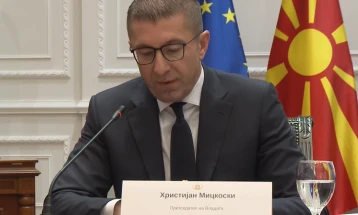Very difficult for people to know source credibility when faced with so much disinformation, Wallis tells MIA
- It is very difficult for people to know whether they can trust this or that source when they are faced with so much disinformation, says EU DisinfoLab President Diana Wallis in an interview with MIA.

Skopje, 22 October 2023 (MIA) – It is very difficult for people to know whether they can trust this or that source when they are faced with so much disinformation, says EU DisinfoLab President Diana Wallis in an interview with MIA.
EU DisinfoLab, an independent non-profit organisation that gathers knowledge and expertise on disinformation in Europe, held its annual conference in Kraków. Over 400 renowned professionals from the entire globe, working in the field of media, countering propaganda and disinformation, had the opportunity to discuss the subject matter, concluding that health, migration, mistrust in institutions, the war in Ukraine and climate change are the major narratives that comprise the landscape of disinformation in Europe. Those behind disinformation find increasingly creative ways to spread them, intensifying ahead of election cycles.
Following is the full text of the interview:

The EU DisinfoLab annual conference was held in Kraków, attended by about 400 participants. What was the focus of this year’s event?
The main focus has become our selling point, we act as a gathering point for the disinformation community. You would have seen today that we have people from all over Europe and beyond come to this conference that is kind of the main event in this disinformation year, with people who are involved in government, journalists, from all different sectors that deal with information can get together and share their experience. We have people speak at the conference who have real experience with disinformation. For example, our first speaker was a young guy called Brett Lee who was completely sucked in to the conspiracy theory world but managed to come out again. He is now an ardent advocate in trying to get people out of this sort of problem.
What are the latest disinformation trends registered in European countries?
Obviously, it has been a lot to do with Russia because of the war. What we see is that those who perpetrate this information are always becoming cleverer in the ways they do it. For instance, we published a report earlier this year, which showed how those who are trying to circulate disinformation are sort of disguising themselves as mainstream media outlets on the web. People would be taken in by the look or whatever else and that’s really quite disturbing. It seems to us sometimes that the legislators are always running several paces behind or more.

What is the most absurd piece of disinformation that you have come across in your work, if you could single out one?
When you look at something, you realize if you start to dig that it’s just misrepresentation, it’s about to do with the way it’s presented. Sometimes the facts will draw people in, but the way it’s got up to look like something else. We had one the other year where it’s been disseminated elsewhere in the world, in this case in India, trying to make itself look like a very respectable institution in the EU.
Disinformation and crises are “best friends”. We are coping with the war in Ukraine, whereas the Middle East conflict is intensifying. Do crises produce disinformation or does disinformation fuel crises?
It is a circuitous relationship and some of the things that we’ve heard today reinforce that. The problem is that people are faced so much with disinformation, it is very difficult for them to know whether they can trust this or that source. They try to go to the ones they know, in my country it’s the BBC. Even an institution like the BBC is criticized for apparently not showing both sides of the arguments as it is ought to do. So people are also mistrustful of some of the sources that ought to be good. When people start to have that sort of mistrust, they start to look at alternative sources which, as we know, can be very dangerous.

Disinformation shrinks trust in journalism, citizens do not often differ between those who spread disinformation and professional journalists. How can we protect free journalism?
Most of you as journalists have codes of conduct and you are meant to behave in a certain way in terms of what you report, to check your sources, to be very careful. I think keeping to those codes of conduct that should, in some way, provide a safety. We are dealing now, for many reasons, with a very skeptical public and that makes it much more difficult, but all the more reason for you to be even better than before. There are things that lawmakers can do to try to help and protect journalists, the way they work, their sources and other things. And there is this terrible tendency we’ve got now for these so-called strategic lawsuits against the public interest, the SLAPPs.
Is implementation of the Media Freedom Act, the Digital Services Act or other regulations and policy initiatives a solution for EU states? All of this is already on paper, can it be implemented in practice?
In many ways I’ve always felt the EU works on the basis of dialogue, and if you have these laws, and you’re right, sometimes you have them and you feel is anybody actually going to make them work? But, I do think that what the EU law often does is make sure that platforms are talking to lawmakers, talking to the Commission, and for this coming year, when we have a lot of elections across Europe, I was hearing today the Commission are very much in dialogue with the platforms. So, it may seem from the outside that nothing has changed, but I think actually something has changed and there is a lot more working going on to make sure that the space we have in Europe is safer than it was.

You say that free media need support to be free and protected from bad actors. Are we putting ourselves in danger of taking away their freedom by protecting them?
Some of us have a concern that, yes media are rightfully treated as special, but in order to guarantee that special treatment, specifically when stuff from you is posted online, if stuff is put online, that is not correct, that is potentially damaging, it needs to come down quickly and therefore we were very pleased to see the provisions in the Digital Services Act which allowed for immediate takedown. Now, that is perhaps going to be amended by the Media Freedom Act to allow a sort of 24-hour period where media are involved. I accept that there are many very responsible media outlets out there, but those 24 hours, there’s an old saying in my country – lies, etc., are off straight away, within minutes, within hours now on the internet, and the truth takes days to get its boots on, and it’s too late.
Can you explain more in detail the conflict between the Media Freedom Act and the Digital Services Act, and how can this be overcome?
I think you have to go back to the position in the Digital Services Act and that has to take priority, if something is out there that is incorrect, it needs to be dealt with immediately, and there shouldn’t be this period of hanging about. Because, first of all, there’s going to be a big discussion about who or who isn’t media, and secondly, there’s going to be an argument and once that argument goes on over 24 hours, or however long, it’s too late, the damage has been done.

Artificial intelligence is becoming an increasingly important topic because of its capacity to generate fictitious content that looks hyperrealistic, as well as its alleged capacity to cope with disinformation faster than humans. Do you think that AI represents a threat to journalism or can it be useful in improving journalistic skills?
I’ve taken the view that in the main, artificial intelligence is potentially a force for good, but it has to be interpreted or used by a human mind, and that’s a responsibility on us, as to how we use it. We’ve had a lot of talk here today about AI and my view still remains the same. It can do so much for us, but we have to know how to use it. Somebody was explaining in the session that we just had, that a picture of somebody online, a child in a war zone had really badly affected him, but AI would have never seen that. It was a human response, and it’s our human response to things that are visual, things that are written, that AI can never replace. Therefore, I think AI can do some very wonderful things, but it always for the moment should need us as mediators of the content.
Ana Cvetkovska
Photo: MIA







